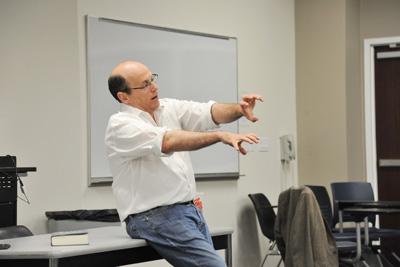
Kurt Eichenwald spoke to a group of SMU students as a part of the O’Neil Lecture series on Thursday in Umphrey Lee room 241. (Sidney Hollingsworth/The Daily Campus)
“Nobody has a monopoly on truth, and if we are so obsessed if we are so childish that we cannot try to hear things that we don’t necessarily feel comfortable with that don’t necessarily conform with what we want to believe then we are willfully making ourselves stupid.”
Challenging audience members to both recognize and resist bias, Kurt Eichenwald explored more than his newest book, “500 Days: Secrets and Lies in the Terror Wars,” during the 2012 William J. O’Neil Lecture in Business Journalism, which took place in Umphrey Lee Center Thursday evening.
“I always used to say everyone’s going to hate this book the reason everybody’s going to hate this book is because one of the things that I know from reporting is almost never - once you start digging into a story – does everything line up the way people want it to,” Eichenwald said.
Weaving humor and personal anecdotes throughout his lecture, The New York Times best-selling author actively engaged audience members, igniting laughter among journalism students and professors alike, and ultimately encouraged them to realize that “we are experiencing the death of knowledge in this country.”
The reason for this apparent death, according to Eichenwald, is that while one used to have to actually make an effort in order to know a fact, “now, facts are sliced and diced and twisted and presented the way you want to hear [them].” Eichenwald argued “we are being suckered into” this alleged “business model” – this “recognition that if we reinforce what people want to believe, they’ll keep coming back.”
“If you are reading something that doesn’t agree with what you walk into thinking, don’t assume you don’t need to read it – in fact, in all probability, that’s what you need to read the most,” he said.
Eichenwald identified bias not as opinion, but as “a refusal to look at fact,” and acknowledged biased readers as the greatest problem in the realm of journalism today.
Thus, in composing “500 Days: Secrets and Lies in the Terror Wars,” Eichenwald strived not to allow his desires to shape or override his information, and devoted six years to the investigation of a mere 500 days. He urged audience members to delve into the thick text, to read it in its entirety and to decipher what and whose “secrets” and “lies” – both of which he refers to in the title of the book – for themselves.
“What’s my bias? Nothing, this is just how it comes out,” he said.








